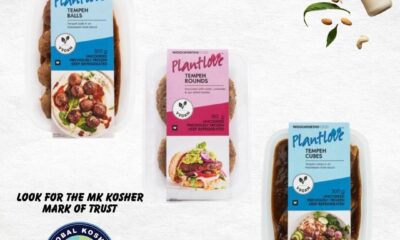
News

“The consumer is the ultimate winner,” MK Kosher says as it expands in SA
In what could be a game changer for kashrut in South Africa, MK Kosher, a global kosher certifier, is expanding its operations in the country.
“In a way, it has expanded itself as we have had an increase in calls from companies looking to outsource their kosher certification and get an internationally-recognised hechsher which could open the door to exports,” MK Executive Director Rabbi Saul Emanuel told the SA Jewish Report on a call from Canada.
In a press release on 8 November 2021, the certifier said it had recruited Rabbi Yossi Baumgarten and Rabbi Berel Rodal to lead its rapidly growing operations in South Africa. MK first entered South Africa when South African health-food company The Chocolate Tree and Nu Tree adopted its hechsher around March 2021.
“As the need for our certification is expanding, we need experts on the ground, and Rabbi Baumgarten is a world-renowned expert,” said Emanuel, who is an ex-South African. He worked for the kashrut department of the South African Beth Din for 10 years prior to moving to Canada.
Explaining how he came to take on the new role, Baumgarten said, “Rabbi Emanuel and I worked together in the Johannesburg kashrut department for about a decade. When he heard that I was working as a kosher consultant, he asked me to join the MK team.
“With Hashem’s help, this new venture will enable kosher consumers locally and internationally to have a wider range of kosher-certified products as well as giving South African companies new export opportunities. I enjoy finding solutions to the challenges involved in kosher certification, and there is great satisfaction when a needed or desired product becomes available to either consumers or manufacturers.”
Said Emanuel, “Rabbi Baumgarten, who will be our senior regional co-ordinator for Africa, has been the leading expert for kosher certification in South Africa for more than four decades and has written extensively on the subject. Rabbi Rodal, who will serve as our rabbinic co-ordinator for the South African region, worked in the kashrus field in his native Italy for a decade before moving to Johannesburg in 2003.”
Emanuel said Baumgarten had extensive experience in visiting companies and guiding them in securing kashrut accreditation, and would bring this expertise to this role. He will co-ordinate a team to conduct ongoing spot inspections and to work hand in hand with manufacturers regarding their kosher certification.
He said enquiries had come from some companies which had been kosher-certified in the past and some which had not. “Various companies are showing interest, and we are answering those calls.”
He emphasised that MK was looking to work only in the manufacturing sphere, and wouldn’t be involved in restaurants, butchers, shechita, or other enterprises, and he hopes consumers will benefit from increased competition. MK would be happy to work with the United Orthodox Synagogues (UOS) kashrut department, Emanuel said. “If the company requests that we work together, we would be very glad to do so.” This includes dual certification.
Meanwhile, the managing director of the kosher department of the UOS, Rabbi Dovi Goldstein, said it was also offering international certification.
Speaking to the SA Jewish Report from the United States where he had just arrived for Kosherfest, Goldstein said, “We have partnered with the world’s largest hechsher, the OU [Orthodox Union], with the launch of Kosher Arabia several months ago. We are offering all our manufacturers the ability to be dual certified with the OU hechsher on their products, which was rolled out two weeks ago. This improves the ability of South African companies to export their product across the globe, where the OU’s brand is well known.”
The kosher food market is the fastest growing segment of the food industry, expanding by more than 10% every year. A key reason for the growth is that consumers know that kosher food is produced according to strict quality control guidelines. In addition, those with allergies and intolerances know they can trust the ingredients listed on kosher-certified products.
“I’m proud to be joining the MK team because they share my commitment to working hand in hand with food manufacturers and producers in order to meet the highest possible standards of kashrut,” said Baumgarten.
“To be working with Rabbi Baumgarten is a real honour,” said Rodal. “He personifies kosher certification in our community and with good reason, is respected and acknowledged by consumers and kashrut agencies across the globe. He fully understands the halachic questions which may arise at facilities, and has carried out thousands of inspections across Africa and internationally over the years. The big winners are consumers. When they see the MK brand, they are assured that the item is of a gold-standard kashrut.”
Said Goldstein, “The kosher department of the UOS will continue to innovate to ensure more people eat more kosher more often. The UOS is a non-profit organisation that ensures all aspects of Orthodox Jewish life and halachic observance are of the highest standard in South Africa. To this extent, we ensure the community has a well-respected Beth Din, kosher mikvahs and eiruvs, halachic supervision of marriage and divorce, and importantly, the highest levels of kashrut.”











Hein Zentgraf
November 11, 2021 at 8:05 pm
All this still doesn’t justify the exorbitant prices of kosher food. It is a scam, as far as I am concerned.
ALLAN RABBIE
January 27, 2022 at 11:15 am
Perhaps now the monopoly and chicken and meat will be broken
Good luck to the new Kosher authority